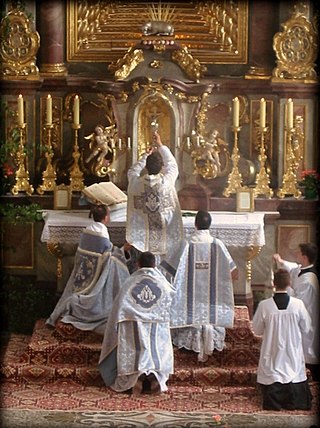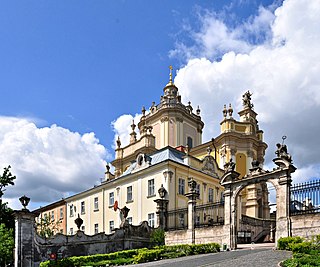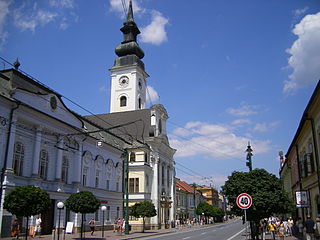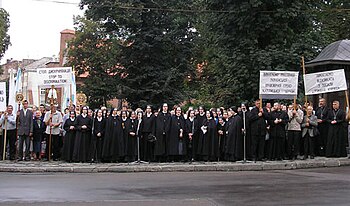The Eastern Orthodox Church, officially the Orthodox Catholic Church and commonly known simply as the Orthodox Church is a communion composed of up to seventeen separate autocephalous (self-governing) hierarchical churches that profess Eastern Orthodoxy and recognise each other as canonical (regular) Eastern Orthodox Christian churches.

The Ecumenical Patriarchate of Constantinople is one of the fifteen to seventeen autocephalous churches that together compose the Eastern Orthodox Church. It is headed by the Ecumenical Patriarch of Constantinople.

Traditionalist Catholicism is a movement that emphasizes beliefs, practices, customs, traditions, liturgical forms, devotions and presentations of teaching associated with the Catholic Church before the Second Vatican Council (1962–1965). Traditionalist Catholics particularly emphasize the Tridentine Mass, the Roman Rite liturgy largely replaced in general use by the post-Second Vatican Council Mass of Paul VI.

An exarch was the holder of any of various historical offices, some of them being political or military and others being ecclesiastical.

The history of Christianity in Ukraine dates back to the earliest centuries of the history of Christianity, to the Apostolic Age, with mission trips along the Black Sea and a legend of Andrew the Apostle even ascending the hills of Kiev. The first Christian community on territory of modern Ukraine is documented as early as the 9th century with the establishment of the Metropolitanate of Gothia, which was centered in the Crimean peninsula. However, on territory of the Old Rus in Kiev, Christianity became the dominant religion since its official acceptance in 989 by Vladimir the Great, who brought it from Byzantine Crimea and installed it as the state religion of medieval Kievan Rus (Ruthenia), with the metropolitan see in Kiev.

The Ukrainian Autocephalous Orthodox Church was one of the three major Eastern Orthodox churches in Ukraine. The Ukrainian Autocephalous Orthodox Church began in 1917 during the dissolution of the Russian Empire as part of the Ukrainian independence movement and in order to restore the Ukrainian Orthodox Church that existed in the Polish-Lithuanian Commonwealth in 1620–1685 and was annexed by the Moscow Patriarchate without approval of the Ecumenical Patriarchate of Constantinople.
The Orthodox Church of the Czech Lands and Slovakia is a self-governing body of the Eastern Orthodox Church that territorially covers the countries of the Czech Republic and Slovakia. The current primate of the Czech and Slovak Orthodox Church is Rastislav of Prešov, Metropolitan of the Czech Lands and Slovakia since 2014.

The Ukrainian Greek Catholic Church (UGCC) is a major archiepiscopal sui iuris ("autonomous") Eastern Catholic church that is based in Ukraine. As a particular church of the Catholic Church, it is in full communion with the Holy See. It is the second-largest particular church in the Catholic Church after the Latin Church. The major archbishop presides over the entire Church but is not distinguished with the patriarchal title. The incumbent Major Archbishop is Sviatoslav Shevchuk.

Josaphat Kuntsevych, OSBM was a Basilian hieromonk and archeparch of the Ruthenian Uniate Church who on 12 November 1623 was beaten to death with an axe during an anti-Catholic riot by Eastern Orthodox Belarusians in Vitebsk, in the eastern peripheries of the Polish–Lithuanian Commonwealth.

In the Eastern Catholic Churches, major archbishop is a title for the chief hierarch of an autonomous particular Church that has not been "endowed with the patriarchal title". Major archbishops generally have the same rights, privileges, and jurisdiction as Eastern Catholic patriarchs, except where expressly provided otherwise, and rank immediately after them in precedence of honor.
Basil Kovpak is a Ukrainian Traditionalist Catholic priest and the founder and current head of the Priestly Society of Saint Josaphat. Formerly a priest of the Archeparchy of Lviv of the Ukrainian Greek Catholic Church (UGCC), Kovpak was excommunicated by the UGCC in 2007.

Josyf Slipyi was a Major Archbishop of the Ukrainian Greek Catholic Church and a cardinal of the Catholic Church.

The Slovak Greek Catholic Church or Byzantine Catholic Church in Slovakia, is a sui iuris (autonomous) Eastern Catholic church based in Slovakia. As a particular church of the Catholic Church, it is in full communion with the Holy See. The church is organised as a single ecclesiastical province with one metropolitan see. Its liturgical rite is the Byzantine Rite. In 2008 in Slovakia alone, the Greek Catholic Church in Slovakia had some 350,000 faithful, 374 priests and 254 parishes. In 2017, the Catholic Church counted 207,320 Greek Catholics in Slovakia worldwide, representing roughly one percent of all Eastern Catholics.

The Eparchy of the Holy Family of London is an eparchy of the Ukrainian Greek Catholic Church which is an Eastern Catholic Church that is in full communion with the Holy See. It's territorial remit includes the entirety of the islands of Great Britain and Ireland. The episcopal seat is the Cathedral of the Holy Family in Exile which is situated in the city of London. The incumbent eparch, Kenneth Nowakowski, was appointed on 15 January 2020.

The Priestly Society of Saint Josaphat Kuntsevych (SSJK) is a society of traditionalist priests and seminarians originating from the Ukrainian Greek Catholic Church which is led by the excommunicated priest Basil Kovpak. It is based in Riasne, Lviv, Western Ukraine. In Lviv, the society maintains a seminary, at which currently thirty students reside, and takes care of a small convent of Basilian sisters. The SSJK is affiliated with the Society of St. Pius X and Holy Orders are conferred by the latter society's bishops in the Roman Rite. The SSJK clergymen, however, exclusively follow a version of Slavonic Byzantine Rite in the Ruthenian recension.

The Cathedral of the Resurrection of Christ is the main cathedral of the Ukrainian Greek Catholic Church, located in Kyiv, the capital of Ukraine. The church was opened on March 27, 2011. While the locally used term "patriarchal" reflects Ukrainian Greek Catholic desire to have their major archbishop recognized as a "patriarch," the Catholic Church does not officially regard this sui iuris church as a "patriarchate," just as the largest branches of Orthodox Christianity in Ukraine do not regard their respective bishops of Kyiv as "patriarchs."

Sviatoslav Shevchuk is a Ukrainian Catholic prelate who has served as the Major Archbishop of Kyiv–Galicia and Primate of the Ukrainian Greek Catholic Church (UGCC) since 25 March 2011.

The Ukrainian Greek Catholic Church in the USSR refers to the period in its history between 1939 and 1991, when Ukraine was part of the Soviet Union.

Bishop Dionisio Paulo Lachovicz, O.S.B.M. is a Brazilian-born Ukrainian Greek Catholic hierarch. He was an Apostolic Visitor for the Ukrainian Greek Catholics in Italy and Spain. Prior to this appointment, he served as a Curial Bishop of the Major Archeparchy of Kyiv-Halych from December 21, 2005, until January 19, 2009, under the title of Titular Bishop of Egnatia. From September 5, 2019, he is a Delegate with the rights of Apostolic Exarch for the Ukrainian Catholic Apostolic Exarchate of Italy.

The Metropolis of Kyiv was an autonomous metropolis of the Ecumenical Patriarchate of Constantinople with center in Kyiv after its formation in 988 as a result of the Christianization of Rus by Volodymyr the Great until January 6, 2019, when it received the Tomos on Autocephaly.


















